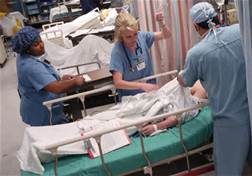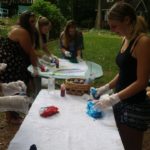Online Education Options for Au Pairs: Au pairs may take up to 36 hours online if this course is not locally offered in person. Local in-person classes should be a priority for achieving the education component.
Education:
Your course will be approved if these things are met:
1. Comes from an accredited college, university or technical college approved by the DOS.
2. The college, university, or technical school must be an American school.
3. Provide a certificate and proof of registration. These must be EMAILED to your community counselor.
4. All classes must be finished by the end of your 11th month….30 days before the end of your year. If you are extending with a new family, the education has to be finished by the 8th month of your term.
Please submit all certificates at the time you finish them by emailing them to the counselor at her APIA address. Don’t wait to send all at once.
5. 72 hours or 7.2 CEUs must be achieved in order to extend a term.
6. Au pairs in their extension term must also earn 72 hours for a one-year extension or a 9-month extension. 36 hours or 3.6 CEUs for a 6-month extension.
7.. A special 6-month extension requires 36 hours or 3.6 CEUs.
8. The education allowance is available to assist with earning certificates or paying tuition for a class. It is not paid directly to the Au pair. Maximum of 500.00 per year for the first term or a 12-month or 9-month extension. Maximum of 250.00 for a 6-month extension. This allowance is only for education-related expenses and is paid directly to a college.
ALL CLasses must be from an accredited, USA college or university!
Some classes are grouped together and are called a ” Specialization”. This means that each course within the specialization group must be taken and will give a specific amount of hours. Please count each course’s hours to total up how many you will achieve.
Most Popular Search Mechanisms: NOT all classes found will be approved by the State Department. Check with your counselor BEFORE you sign up!
www.coursera.org
www.edx.org
www.ed2go.com/
https://online-learning.harvard.edu/catalog
Most Popular Courses:
The Science of Well Being – www.coursera.org/learn/the-science-of-well-being
Dog Emotion and Cognition – www.coursera.org/learn/dog-emotion-and-cognition
Interior Design – www.ed2go.com/courses/arts-and-design/graphic-arts/ilc/introduction-to-interior-design
Introduction to Hospitality and Tourism Industry – https://www.edx.org/course/introduction-to-hospitality-and-tourism-industry
Computer Science for Business Professionals – https://online-learning.harvard.edu/course/cs50s-computer-science-business-professionals?delta=0
How to Write an Essay – https://www.edx.org/course/how-to-write-an-essay
Tricky American English Pronunciation – https://www.classcentral.com/course/tricky-american-english-pronunciation-8274
Fundamentals of Supervision and Management – www.ed2go.com/courses/business/soft-skills/ilc/fundamentals-of-supervision-and-management
This course is from the University of Pennsylvania and yields 40 hours. It is self-paced. You can do the work whenever you have time. There is no specific class time.
English for Career Development – https://www.coursera.org/learn/careerdevelopment
Improve your English Communication Skills – https://www.coursera.org/specializations/improve-english?
Photography – www.ed2go.com/schoolcraft/online-courses/secrets-of-better-photography/
Culinary Arts – https://classroomaupair.org/intro-to-culinary-arts/
Best Course for 5 Hours:
Fairfax University of America – Online Museum Courses https://www.fxua.edu/sls/programs/non-intensive-esl/#museum-classes
Best ESL/TOEFL Courses:
The University of California at Irvine offers a series of classes: https://www.coursera.org/specializations/intermediate-grammar
International Language Institute – DC – www.ilidc.com
LADO – DC Metro Area – www.lado.com
UCEDA – https://uceda.edu/toefl-preparation/ or https://uceda.edu/aupair/ for ESL classes, too.
Kenton County Adult ESL – https://www.kentonesl.org/
Community College of Allegheny County – Grammar Refresher – https://www.ed2go.com/ccac/online-courses/grammar-refresher
Zoni Language Center – Intermediate Conversations – www.zoni.edu/intensive-english-program/
Hudson County Community College – English Skills for Real Life Situations – https://classroomaupair.org/english
Prince Georges Community College – ESL – https://www.pgcc.edu/go/adulteducationesl/
Fairfax Universtiy of America – https://www.fxua.edu/sls/programs/non-intensive-esl/
Georgia Tech Language Institute – https://esl.gatech.edu/additional-programs/short-courses
International Language Institute – www.ilidc.com
https://www.ed2go.com/courses/language/languages/ilc/speed-spanish
https://www.coursera.org/specializations/learn-spanish
More Popular Choices:
Teaching English courses: https://www.coursera.org/learn/tesol-writing
Learning Across America and Learning Express – https://www.learningacrossamerica.net/find-your-class
Classroom Au Pair – www.classroomaupair.org
Psychology Classes:
Yale University: One course gives 15 hours https://www.coursera.org/learn/introduction-psychology?recoOrder=5&utm_medium=email&utm_source=recommendations&utm_campaign=Kl0YwECzEeuTnfsZ4aha4w
Penn State University: five courses in the specialization giving 80 hours. https://www.coursera.org/specializations/positivepsychology?recoOrder=8&utm_medium=email&utm_source=recommendations&utm_campaign=Kl0YwECzEeuTnfsZ4aha4w
Wesleyan Unversity 38 hours https://www.coursera.org/learn/social-psychology?




















